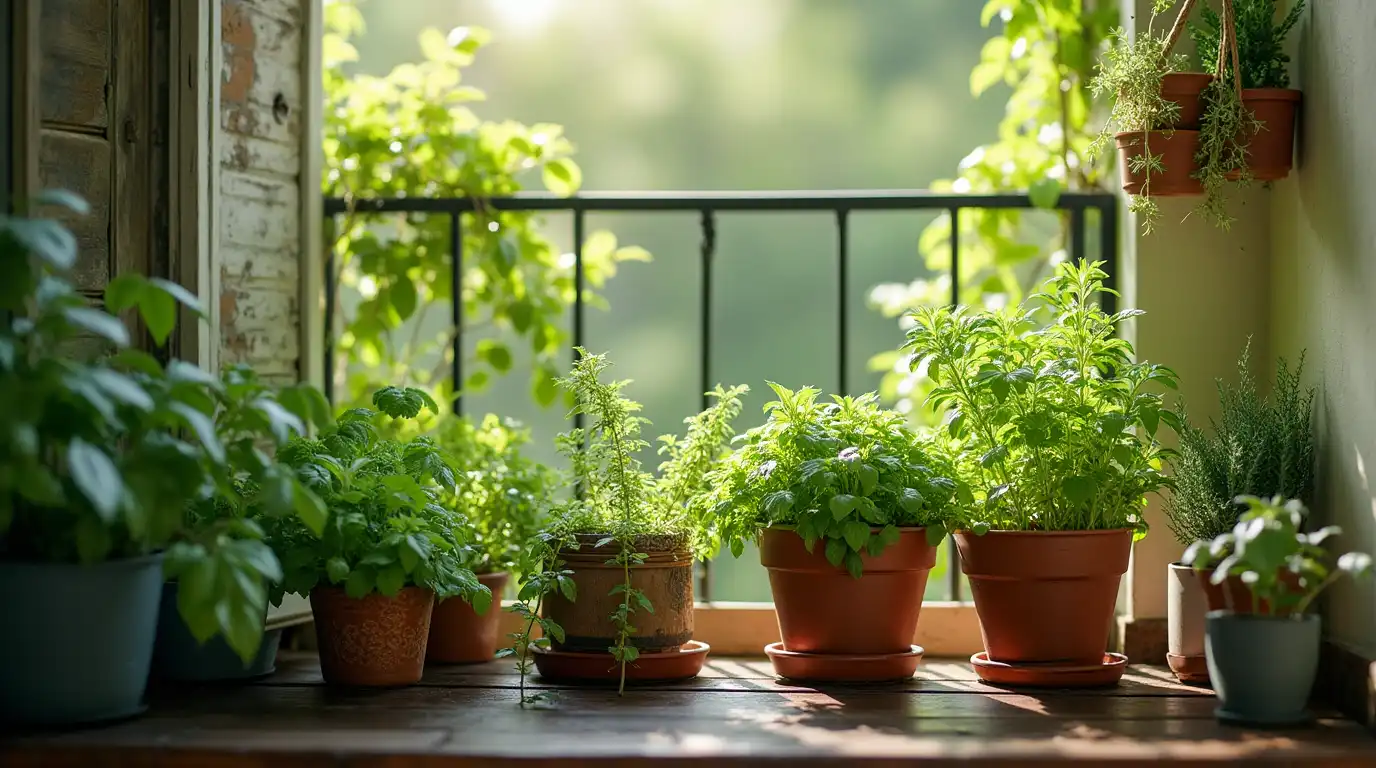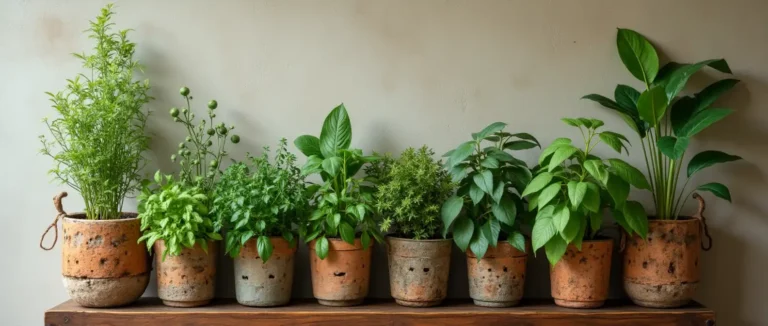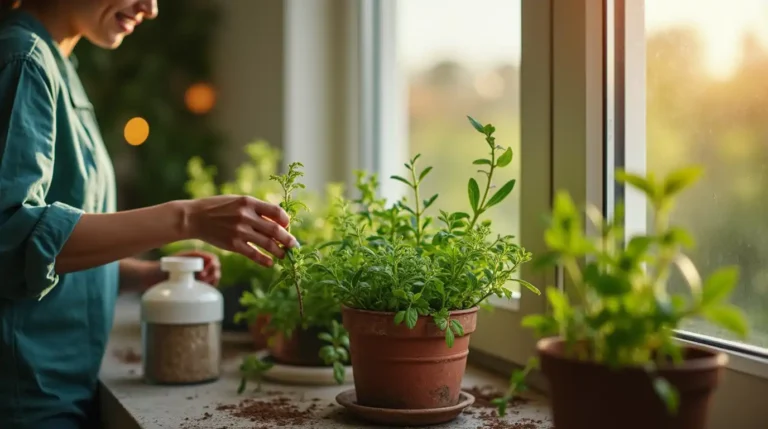How to Create a Thriving Balcony Herb Garden in Small Spaces
Introduction to Your Balcony Herb Garden
Table of Contents
ToggleA balcony herb garden is a wonderful way to bring a bit of nature into your urban living space. Whether you live in a city apartment with a tiny balcony or you’re lucky enough to have a larger terrace, a balcony herb garden allows you to grow fresh, flavorful herbs right at your doorstep. Not only does it provide you with an ongoing supply of herbs for your kitchen, but it also creates a charming outdoor space that you can enjoy year-round.
Growing herbs on your balcony is especially ideal for those who live in small spaces. With a bit of planning and the right tools, you can grow a thriving herb garden even in the smallest of urban environments. Balcony herb gardens can be an incredibly rewarding hobby, offering everything from the ability to enhance your cooking to the satisfaction of growing your own food.
In this article, we will walk you through everything you need to know to create a thriving herb garden on your balcony. From choosing the right herbs to maximizing your space and lighting, we’ll provide essential tips and tricks to help you get started.
Why a Balcony Herb Garden is Perfect for Small Spaces
Balcony herb gardens are ideal for urban dwellers with limited space. In small apartments or homes, you don’t always have the luxury of a large garden. However, a balcony provides a perfect opportunity to grow your own fresh herbs. Even in the tiniest spaces, balcony herb gardening allows you to create a productive and green environment.
One of the great things about balcony herb gardens is that many herbs do well in small pots and containers. Herbs like basil, thyme, and rosemary are perfect candidates for container gardening. Additionally, herbs like parsley, oregano, and chives thrive in small spaces, making them perfect for balconies.
Not only do balcony herb gardens improve the aesthetics of your living space, but they also provide you with fresh, home-grown ingredients for cooking. Growing your own herbs allows you to enjoy better-tasting food and can even inspire you to try new recipes. The best part is that balcony herb gardens are low maintenance, making them a perfect hobby for beginners.
Choosing the Right Herbs for Your Balcony Herb Garden
Selecting the right herbs for your balcony herb garden is one of the first steps to ensuring success. Since balcony gardens are typically smaller, you’ll want to choose herbs that thrive in containers and require minimal space to grow.
Popular Herbs for Balcony Gardening
Some of the most popular herbs for balcony gardening include basil, rosemary, thyme, mint, parsley, and chives. These herbs not only grow well in pots but are also hardy and easy to care for. Many herbs are perfect for balcony gardens because they don’t need large amounts of space to grow successfully.
- Basil is a great herb to start with if you’re new to gardening. It requires full sun and is easy to grow in pots.
- Mint is another excellent herb for balcony gardens. It can grow in partial shade and in a variety of conditions, making it perfect for beginners.
- Thyme is a hardy herb that thrives in dry conditions and needs only occasional watering, making it ideal for balconies with a lot of sun.
If you’re looking for a more diverse herb garden, you can also include more exotic herbs such as lemongrass or lavender. Just be mindful of their space and sunlight needs.
Herbs for Beginners
If you’re a beginner, start with herbs that are easy to grow and maintain. Basil, mint, and chives are all good choices for newcomers. These herbs are hardy and can grow well even with minimal attention. Basil thrives in warm, sunny locations, while mint and chives can tolerate partial shade, making them versatile options for balconies with varying light conditions.
For more experienced gardeners, you might want to explore herbs like rosemary and oregano, which can be a bit more finicky but yield flavorful results when grown properly.
Maximizing Light and Space in Your Balcony Herb Garden
Maximizing both light and space is key to the success of your balcony herb garden. Balcony gardens tend to be smaller and receive limited sunlight, so it’s important to make the most of the space you have available and optimize light exposure.
Optimizing Sunlight for Your Balcony Herb Garden
Sunlight is crucial for the health of your herbs. Some herbs, such as basil and lavender, require at least six hours of direct sunlight per day to grow properly. On the other hand, herbs like mint, parsley, and cilantro can tolerate partial shade. Pay attention to how much sunlight your balcony receives throughout the day and choose herbs that match the light conditions.
If you find that your balcony gets limited sunlight, there are several ways to optimize the light your plants receive. For instance, rotating your plants every few days can help ensure that all sides of the plant get adequate exposure. Additionally, placing lighter-colored surfaces, such as white walls or mirrors, near your plants can reflect sunlight onto them, enhancing light exposure.
Maximizing Space in a Small Balcony Garden
Even if your balcony is small, you can still make the most of the available space by using creative gardening techniques.
Vertical gardening is one of the best ways to maximize space on a small balcony. Install shelves or use wall-mounted racks to grow herbs vertically. You can also hang plants from the ceiling using baskets or pots, creating a garden that doesn’t take up much floor space.
Railing planters are another great space-saving option. These planters are designed to sit on the edge of your balcony railing, allowing you to grow herbs without taking up any extra space. Plus, they offer good drainage and can accommodate multiple herbs.
By thinking vertically and using hanging planters, you can create a beautiful and functional garden even in a compact space.
Essential Tools for a Successful Balcony Herb Garden
To ensure your balcony herb garden thrives, you’ll need a few essential tools. Here are the basics you’ll want to have on hand:
Quality Potting Mix: Always use a high-quality potting mix specifically designed for container plants. Good potting soil provides the right balance of moisture retention and drainage, ensuring your herbs have the best environment to grow in.
Containers with Good Drainage: Make sure all of your containers have drainage holes to prevent water from pooling at the bottom, which can lead to root rot. Consider using self-watering containers, which can help maintain consistent moisture levels for your herbs.
Hand Tools: A small hand trowel and pruning shears are essential for planting and maintaining your herbs. These tools allow you to dig holes for planting, trim dead leaves, and manage the overall health of your plants.
Watering Can: A watering can with a long spout is ideal for reaching into small pots and containers. Watering your plants evenly is important to avoid over-watering or underwatering.
Organic Fertilizers: To keep your herbs healthy and vibrant, use organic fertilizers that nourish the plants without using harmful chemicals.
Watering Tips for Your Balcony Herb Garden
Proper watering is essential to the success of your balcony herb garden. Too much water can lead to root rot, while too little water will cause your herbs to wilt. Here’s how to strike the right balance:
Check Soil Moisture: To determine when to water your herbs, check the top inch of soil. If the soil feels dry to the touch, it’s time to water.
Watering Frequency: Herbs in containers tend to dry out faster than those in the ground, so they may need to be watered more frequently. However, be sure to let the soil dry out slightly between watering to prevent over-watering.
Drip Irrigation: If you’re concerned about over-watering, consider installing a simple drip irrigation system. This system ensures that your herbs receive consistent moisture without the risk of over-watering.
External Resources for Your Balcony Herb Garden
For additional tips and expert advice, we recommend checking out resources like The National Gardening Association or The Old Farmer’s Almanac, which offer helpful articles and gardening tips for small spaces. These external resources provide great information on balcony gardening and can help you troubleshoot any issues you might encounter with your herb garden.
Internal Links for Your Balcony Herb Garden
Looking to expand your knowledge on balcony herb gardening? Check out our other articles on topics like Balcony Herb Garden Design Ideas, DIY Balcony Herb Garden Projects, or Herb Care Tips. These internal links will guide you through various aspects of balcony herb gardening, offering more inspiration and advice to help you succeed.
Conclusion: Create Your Own Balcony Herb Garden
Creating your own balcony herb garden is a rewarding and enjoyable project that will transform your small space into a productive and beautiful green oasis. Whether you’re growing fresh basil, mint, or rosemary, having access to home-grown herbs can enhance your cooking and bring a touch of nature to your everyday life.
With the right tools, a bit of creativity, and a willingness to experiment, your balcony herb garden can thrive. Whether you’re an experienced gardener or a complete beginner, balcony herb gardening is an easy and sustainable way to enjoy fresh herbs right at your doorstep. So, start planting today and turn your balcony into a flourishing herb garden that will add beauty, flavor, and sustainability to your home!






